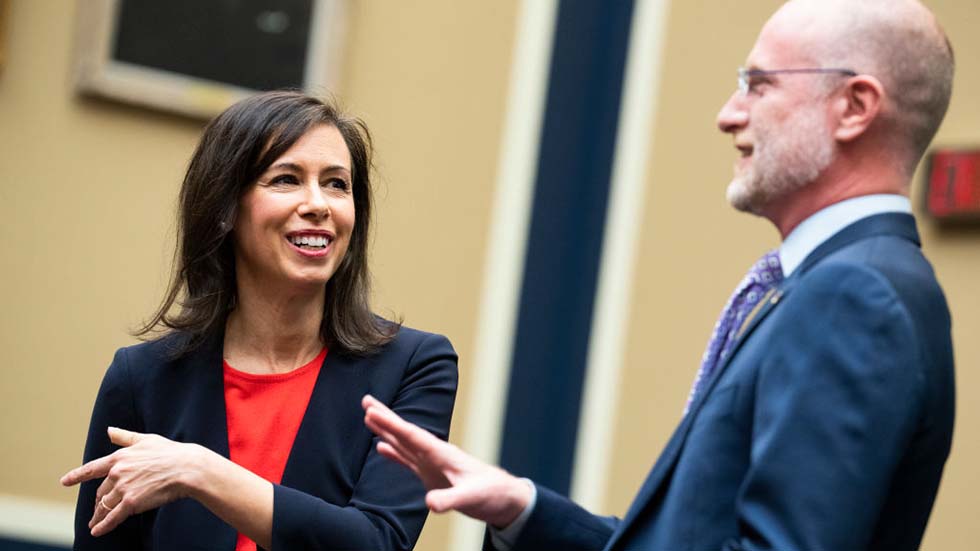FCC Pushes ‘Facts’ for Title II Net Neutrality Redux
Democrat-controlled agency looks to make case for move that could well wind up back in court

The smarter way to stay on top of the multichannel video marketplace. Sign up below.
You are now subscribed
Your newsletter sign-up was successful
FCC chair Jessica Rosenworcel is clearly focused on building both a legal case and public support for the regulator’s reclassification of broadband as a Title II common-carrier service, an effort she is teeing up at this week’s public meeting.
With the Federal Communications Commission’s Democratic majority on the record in support of that Title II designation, the notice of proposed rulemaking (NPRM) will almost certainly pass 3-2, with Republicans holding to form and opposing the effort.
The NPRM will then launch a comment period where, if past is prologue, the FCC will receive lots of input in its public docket before proceeding to a vote on final rules.
As with other FCC efforts to clarify its regulatory authority over internet access, this one will almost certainly be aslo challenged in court and the FCC will need to dot its i’s and cross its t’s beforehand.
The FCC has issued a couple of fact sheets over the past two weeks to help make its case in advance.
One, the “National Security and Public Safety Impacts of Restoring Broadband Oversight,” argues that the COVID-19 pandemic, among other things, has created a new reality in which the FCC “has a responsibility to restore its broadband oversight authority and reimposing net neutrality rules that prevent blocking, throttling and so-called paid prioritization ‘fast lanes.’”
The FCC invoked foreign threats in the sheet, which was sent to reporters and others. It noted that although the agency has taken steps to protect communications networks from hostile governments, the lack of specific authority that Title II would give it over access has left a “national security loophole.”
The smarter way to stay on top of the multichannel video marketplace. Sign up below.
Restoring Title II would allow the FCC to deny foreign governments access to U.S. networks, the fact sheet said.
Another loophole is emergency information, the FCC suggested. “Reclassifying internet access as a Title II service would allow the FCC to require broadband providers to report and address internet outages, like the FCC does for voice service today, and ensure that response personnel know when service is impacted, especially during emergencies,” the fact sheet said.
A federal appeals court, in upholding most of a previous order removing the net neutrality rules and classifying internet access, did cite the FCC’s failure to talk about how its rollback of the rules would affect public safety.
Also Read: Supreme Court To Hear Case That Would Weaken FCC
Rosenworcel says that restoring the rules would just be a way to “kick-start” the process of “rectify[ing] this abdication of national security and public safety oversight.”
In a second “fact sheet,” the FCC pitched the proposal as protecting consumers, more than 80% of whom it said support “open internet protections.”
The FCC said restoring the rules means protecting consumer privacy, ensuring “fair” treatment by ISPs, including preventing them from blocking or throttling internet service or creating paid “fast lanes,” as well as combating VoIP robocalls.
Fair treatment raises another new net neutrality issue since the last battle over the rules — equity, an issue that could bring cost into the equation and raises the specter of some form of rate regulation.
But two parties can play the fact-sheet card.
Republican commissioner Brendan Carr has countered with his own release branding Rosenworcel’s facts as myths.
As to Title II being necessary for national security, for example, Carr said the FCC has been applying the Communications Assistance for Law Enforcement Act (CALEA) to internet service providers without Title II.
And when it comes to consumer protection, Carr said Title II would strip the Federal Trade Commission of its authority over broadband.
Carr did not mince words about the chairwoman's fact sheet efforts.
“As with past iterations of this debate, the plan’s backers are trotting out a series of farcical claims to justify this power grab — claims that are as credible as their assertion in 2017 that ending Title II regulation would slow down and end the Internet,” he wrote in presenting his sheet, adding: “Reminder: mobile speeds are up over 6X since then! So here are just some of today’s top Title II myths followed by facts that set the record straight.”
Net neutrality has been a political battle, but legislators on both sides of the aisle have also tried for years — or at least have made noises like they were trying — to come up with a legislative fix by clarifying what authority they meant to give the FCC when it comes to regulating broadband.
Republicans and industry players have backed legislation that would authorize net neutrality rules against blocking, throttling and anticompetitive paid prioritization so long as it is not under Title II. But many Democrats have argued that such regulations need to be Title II-based, so a congressional solution has been a nonstarter.
Given the bitterly divided — probably dysfunctional — state of the current Congress, a legislative solution appears no closer. That’s despite all sides saying legislation is the best way to prevent the pendulum swings from Title II to Title I with changes in the political makeup of the FCC, giving industry some vaunted regulatory certainty over its billions of dollars in investments.
Contributing editor John Eggerton has been an editor and/or writer on media regulation, legislation and policy for over four decades, including covering the FCC, FTC, Congress, the major media trade associations, and the federal courts. In addition to Multichannel News and Broadcasting + Cable, his work has appeared in Radio World, TV Technology, TV Fax, This Week in Consumer Electronics, Variety and the Encyclopedia Britannica.

